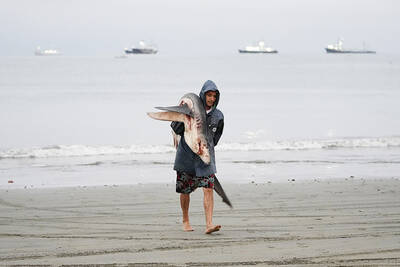The massacre of 30 media workers in the Philippines last month made this year the deadliest year ever for journalists, a report released yesterday showed.
The Committee to Protect Journalists (CPJ), an independent press advocacy group, says at least 68 journalists were killed this year, a 60 percent increase over last year, when 42 deaths were recorded.
“What stands out is that three quarters are killed deliberately for their work, and in 85 percent of these cases no one is brought to justice,” CPJ deputy director Robert Mahoney said in a telephone interview on Wednesday. “This has a poisonous effect on good journalism.”
Until the massacre in the Philippine province of Maguindanao, where 57 people including 30 journalists were killed, this year seemed likely to end with 38 killings.
The previous one-year record was in 2007, when 67 killings were recorded.
Mahoney said the latest figures still represented a disturbing trend, especially in Somalia, where nine journalists were murdered and killed in combat situations.
Four journalists were also killed in Pakistan, making it the second most deadly country this year, followed by Russia, where three journalists were killed.
Two journalists were killed in both Mexico and Sri Lanka. Other countries with media fatalities were Afghanistan, Colombia, El Salvador, Indonesia, Kenya, Madagascar, Nepal, Nigeria, the Occupied Palestinian Territory and Venezuela.
Fifty-six percent of those killed worked for print media, highlighting the continuing importance of newspapers and blogs in covering important stories that may not lend themselves to television.
“In Mexico print journalists, for example, are the ones who tend to write the exposes on organized crime and drug trafficking,” Mahoney said. “It’s the fact that a lot of print journalists are doing that kind of work that gets them killed by assassins.”

Russia and Ukraine have exchanged prisoners of war in the latest such swap that saw the release of hundreds of captives and was brokered with the help of the United Arab Emirates (UAE), officials said on Monday. Ukrainian President Volodymyr Zelenskiy said that 189 Ukrainian prisoners, including military personnel, border guards and national guards — along with two civilians — were freed. He thanked the UAE for helping negotiate the exchange. The Russian Ministry of Defense said that 150 Russian troops were freed from captivity as part of the exchange in which each side released 150 people. The reason for the discrepancy in numbers

BLOODSHED: North Koreans take extreme measures to avoid being taken prisoner and sometimes execute their own forces, Ukrainian President Volodymyr Zelenskiy said Ukrainian President Volodymyr Zelenskiy on Saturday said that Russian and North Korean forces sustained heavy losses in fighting in Russia’s southern Kursk region. Ukrainian and Western assessments say that about 11,000 North Korean troops are deployed in the Kursk region, where Ukrainian forces occupy swathes of territory after staging a mass cross-border incursion in August last year. In his nightly video address, Zelenskiy quoted a report from Ukrainian Commander-in-Chief Oleksandr Syrskyi as saying that the battles had taken place near the village of Makhnovka, not far from the Ukrainian border. “In battles yesterday and today near just one village, Makhnovka,

A shark attack off Egypt’s Red Sea coast killed a tourist and injured another, authorities said on Sunday, with an Italian Ministry of Foreign Affairs source identifying both as Italian nationals. “Two foreigners were attacked by a shark in the northern Marsa Alam area, which led to the injury of one and the death of the other,” the Egyptian Ministry of Environment said in a statement. A source at the Italian foreign ministry said that the man killed was a 48-year-old resident of Rome. The injured man was 69 years old. They were both taken to hospital in Port Ghalib, about 50km north

The foreign ministers of Germany, France and Poland on Tuesday expressed concern about “the political crisis” in Georgia, two days after Mikheil Kavelashvili was formally inaugurated as president of the South Caucasus nation, cementing the ruling party’s grip in what the opposition calls a blow to the country’s EU aspirations and a victory for former imperial ruler Russia. “We strongly condemn last week’s violence against peaceful protesters, media and opposition leaders, and recall Georgian authorities’ responsibility to respect human rights and protect fundamental freedoms, including the freedom to assembly and media freedom,” the three ministers wrote in a joint statement. In reaction